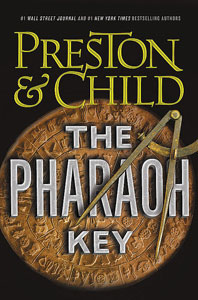It has become comfortingly familiar at this point: Douglas Preston and Lincoln Child take us – via their adventurous leads – to some corner of the Earth that still holds mysteries in the 21st century. Or that we can imagine still holds mysteries, if our knowledge of the place is sketchy enough that we can fool ourselves. The latest locale is southeastern Egypt in “The Pharaoh Key” (June 2018, hardcover), a novel that does its part to get the correct spelling of “pharaoh” back in the lexicon after the success of that darn horse.
In his fifth book, Gideon Crew is mostly in generic protagonist form, which isn’t necessarily a bad thing. With “Gideon’s Sword” in 2011, the authors tried to launch him as a character, but lately he’s been more of a reader surrogate for the adventure and mystery. I’m not complaining, since the last three “Crew” novels are much better than the first two, which bore his name. Crew’s defining trait is that he’s terminally ill; he’ll be perfectly healthy up until the point where he dies from his inoperable brain aneurysm, which could happen any day.
But that seems beside the point – even to Gideon – once this story kicks into gear. It starts with tech magnate Eli Glinn laying off his whole staff as he shutters his company, something that irks Garza and Gideon. After cleverly stealing the Phaistos Disk – the code of the modernized title — from Glinn, the duo heads to Egypt with the agreement that this mission is for themselves, not for an employer or the greater good: If they find treasure, they’ll keep it.
“The Pharaoh Key” is yet another P&C novel that had me going to Google mid-read to look up places. In this case, it’s the Hala’ib Triangle, which is mysterious for both political and geographic reasons. Both Egypt and Sudan claim the area, but both sides mostly leave it alone, and therefore it’s a no-man’s land. That’s real.
What’s perhaps more fictional, but still fascinating, is that – according to the guides in Shalateen, the last outpost of civilization – no one who ventures into the Triangle comes back. In addition to being a parched desert, it’s a treacherous area of sharp rocks amid a maze of mountains and switchbacks. But there are also tales of “mist oases” in the mountains, microclimates that provide water.
When Gideon, Garza and Imogen – an Egyptologist who joins them in an impromptu decision to combine resources – reach the Triangle’s border, they find a warning sign and a field of human skeletons exposed by the drifting sands. They are the casualties from the last Egypt-Sudan battle. As Gideon and Garza search for the location indicated by the Phaistos Disk, their mystery takes on a historic bent, and to go into more detail here would be to spoil the many surprises.
In addition to keeping us on our toes with near-fatal end-of-chapter cliffhangers, Preston and Child let a couple of big mysteries percolate. One is Imogen herself; I correctly guessed her secret. The other is an element that had me thinking back on Preston’s “Blasphemy” (2008) as the authors delve into the origins of monotheism. Some scholars posit that the belief in a single God originated with Akhenaten, the father of King Tut. P&C float the notion that Akhenaten’s groundbreaking belief didn’t catch on with ancient Egyptians – who loved their many gods — but word did spread, eventually leading to Judaism.

One of the characters makes a discovery, perhaps relating to the history of religion or perhaps to the nature of God Himself, but holds it back from other characters. It’s kind of a cheat, as a reader hopes this grand mystery will be revealed, but it certainly did have me racing through the final pages.
It’s perhaps unfair to say “The Pharaoh Key” isn’t a character novel, because the authors do take care to build up Garza into something much more than Glinn’s second-in-command here, giving him a full hero’s journey. Still, with the possible exception of the now-iconic Agent Pendergast (who will return in “Verses of the Dead,” hitting shelves Dec. 31), it’s the still places and mysteries that stand above the authors’ characters. I hope Gideon miraculously survives, but it’s for a selfish reason: I want to see where he’ll go next.

